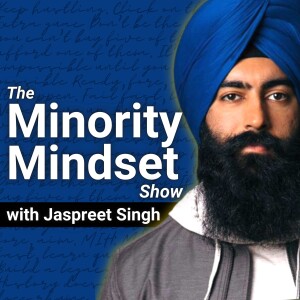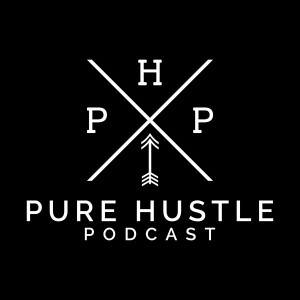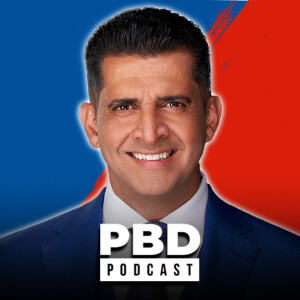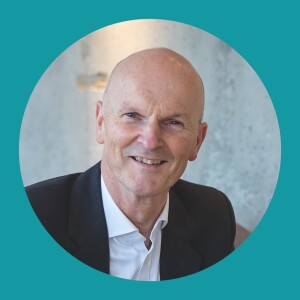

The Compassionate Leadership Interview
https://feeds.captivate.fm/compassionate-leadership/Episode List

Elena Armijo, supporting women in the workplace
Elena Armijo is a Certified Coach, Dare to Lead Facilitator, and founder of the C-Suite Collective, an organisation that supports women in the workplace.Elena started out as an opera singer. Music was a major element of the culture in Las Cruces, Texas, where she grew up. A masters degree in vocal performance was followed by a career singing opera internationally in her 20s and early 30s.She switched careers after a period of 4 years during which she spent 10 months a year on the road, and was in danger of becoming burnt out. Her relationships were suffering.She enlisted a coach to help her take stock. She came to question some of her motives for her choice of vocation up until that point. The experience of working with a coach was pivotal to her, and she resolved to qualify as a coach herself.Elena contends that we need more women in positions of power because they bring a sense of empathy and compassion. It’s not that men don’t have these qualities, but the tradition of male leadership, particularly in the US, is one of power dynamics and control. Men and women have things to teach one another. For example, from the men that have mentored Elena, she has learnt to find her voice and stand up for herself.Elena maintains that “high-achieving women are under-supported in the workplace at every level”: because they are one in a sea of many they don’t often get their needs met. For example, they may need flexibility around parenting, maternity leave, or emotional bandwidth generally. They need supporting from a different perspective. The same HR package can’t be expected to work for everyone.Initially the pandemic exacerbated the situation that women face. In dual-income families it was often the woman who gave up her position in order to home school. However, after two years of the pandemic, a more nuanced conversation is emerging in relation to needs and support.Elena believes excellence in supporting women is characterised by a culture in which women are free to say what is on their minds, where shame is surfaced, and where mental health issues, including incipient burnout, are addressed as they emerge. Coaching can play a key role in this.The first stage of putting such a culture in place is a diagnostic one, using 360 appraisals, and referring to exit interviews. Shifting the culture is a long-term endeavour, starting with the C-suite.Concerning job interviews, Elena says “now is a beautiful time to ask questions, and remember that when you are being interviewed you are also interviewing the other person.”Becoming a Dare to Lead Facilitator was “a really beautiful moment.” Elena says that Brene Brown has created a common language to discuss things openly [shame, guilt, vulnerability, authenticity] that were formerly rarely spoken of.Elena’s proudest achievement in her career as a coach is in “serving marginalised people that get to see possibility for the first time.” (And as an opera singer, singing at Carnegie Hall.)Her biggest mistake as a rookie coach was to try to go too deep too soon with a senior executive. He wasn’t feeling ready to be so vulnerable, and he fired her. They later apologised to one another. It taught Elena the difference between being with people and pushing people.On her journey, Elena was inspired by Michael Madden, her first boss after her opera career. He gave her the opportunity to build what was next for her, and encouragement.To aspiring leaders, Elena would recommend the Dare to Lead and Unlocking Us podcasts, both hosted by Brene Brown. Also anything by Simon Sinek, and ‘I Feel Awful: Chronicles of Leadership’ by Christine Sachs. One of her favourite books on leadership is ‘The Culture Code’ by Daniel Coyle.Elena adopts an in-the-moment approach to self-care, asking herself each morning what she needs that day. Sometimes that can be a cup of tea, or it may be a walk with her dogs, yoga, meditation or working out. For her it’s part of “regrowing the muscle to listen to my own intuition.”Elena’s advice to her 20-year old self would be that considering “who you want to be about things” is critical, and the work will follow from there.

Nancy Kline, the promise that changes everything
Nancy Kline is Founder and President of Time to Think, Author of Time to Think, More Time to Think, and The Promise That Changes Everything: I Won’t Interrupt You. She is a coach and speaker, and a visiting lecturer at Henley Business School.Before ‘coach’ became a common part of the business vocabulary, her job involved listening and helping people to listen to one another, and Nancy was already working on the question “How do we help people to think for themselves?”Nancy has always been a writer – she has written 11 books in all - but ‘Time to Think’ was her breakthrough best seller. At present, and for a while now, she has had to manage the tension between writing, and running a leadership development and coaching business. Ultimately, she has recognised that the two are inextricable and that her writing and her thinking environment work serve each other.Nancy says she experienced her mother (and father) as what she would now call “an embodied thinking environment.” She reflects that her mother hardly ever interrupted her, and she seemed interested all of the time, so much so that her ‘way of being’ became what Nancy understood listening to be. She says “The quality of everything we do depends on the quality of the thinking we do first. And then the quality of our thinking depends on the way people are treating us while we are thinking.”Nancy’s vision is that one day every human being will live in a thinking environment from birth to death. She says ‘Time to Think’ the organisation is not really an organisation but a loose network of qualified professionals. The strategy of ‘Time to Think’ is “to discover, teach, and qualify people” and to work with those qualified people and others to learn and discover more.Nancy’s leadership philosophy is that “the core job of a leader is to generate the finest thinking from everybody whom they influence” which requires them to be able to create the conditions for good independent thinking wherever they are.She believes that there are differences in what the male and female cultures allow by way of instruction in how to lead. She believes that there are facets of female culture that allow them to create thinkingenvironments more consistently than male culture. However, you can learn to superimpose on your own culture the other gender’s cultural permission to create thinking environments. As a generalisation, you often find a better-quality thinking environment where a team has both men and women.Nancy feels deeply committed to the NHS. She came to the UK to live when she married Christopher Spence. She sees the NHS as “one expression of the finest in civilisation.” She believes that human beings are born with a right to healthcare and to education and “there’s something about going to bed at night and knowing that everybody’s going to get the care they need whether or not they can afford it. There’s something dignifying of me in knowing that they’re being dignified.”Nancy’s new book ‘The Promise that Changes Everything’ focuses on the one thing that Nancy considers to be the distinguishing characteristic of a thinking environment and that is the promise “I won’t interrupt you.” The book delineates the four generic systems of interruption that we live in.Nancy says that “the nature of a thinking environment… is that it is ever emergent… we are noticing new things all the time.” So, has she now written all that there is to say on the thinking environment? Probably not!Nancy is proud that she has stayed true to the idea that the conditions for independent thinking are there to be discovered. Therefore, it was never to become a methodology, but it was always going to be a fluid concept. And from the beginning she has wanted there to be “less company and more practitioners.” “Small is beautiful” has remained her organising principle.She has made plenty of mistakes but sees them as positive – it means that we have had the courage to go out there and try – and believes that we should get excited to see that we have made a mistake rather than defensive, frightened, or embarrassed.Nancy has been inspired on her journey by her parents, some important teachers, Christopher her husband, and by Peter Kline. Peter, her first boss, said “our first job here as teachers is to create whatever it will take for these young people to think for themselves, not just to think like us.”Books that Nancy Kline would recommend are “any book by Margaret Heffernan” on leadership, ‘Ignorance’ and ‘Failure’ by Stuart Firestein, and ‘The Tao of Leadership’ by John Heider. Nancy’s self-care regime includes a daily period of sitting and noticing, and starting the planning for her work with the question “What will give me energy and meaning?” She eats well, and she sleeps without an alarm. And also she has a thinking session every Sunday.To her 20-year old self Nancy would say “Please know, Nancy, that all things are going to turn out better than you can possibly imagine.”

Michael West II, Michael's lockdown project
Michael West is Professor in organisational effectiveness and innovation, Lancaster University and Visiting Fellow to the King’s Fund, the NHS Think Tank. He is a former Executive Dean of Aston Business School.This is Chris Whitehead’s second interview with Michael. If you want some background, please listen to episode 13 of the Compassionate Leadership Interview. In this present episode we are going to focus on Michael’s lockdown project, the book Compassionate Leadership: Sustaining Wisdom, Humanity and Presence in Health and Social Care.Michael’s interest in compassion stems from his meditation practice, which has brought him into contact with world religions for which compassion is fundamental. At the same time, his research and consultancy work on leadership and culture, in industry and the NHS, highlighted the importance of positivity and relationships in teams and organisations to effectiveness, creativity, and innovation.The pandemic created a space for Michael in which he could bring together research evidence, case studies, and practical approaches to compassionate leadership. The book was supported by Health Education and Improvement Wales, which has a 10-year strategy to implement compassionate leadership.Organisational culture is a recurring theme in the book. Michael characterises a culture of compassion as one in which people are present with each other, there’s a strong emphasis on relationships, and there is a strong ethic of caring and support for people who are experiencing challenge or difficulty.Michael believes there has been a “sea change” over the past two years in the leadership approach adopted by the NHS. And this applies to Wales, Scotland and Northern Ireland in particular. In England compassionate leadership is part of the NHS People Plan, but practice is less consistent.Coaching and mentoring receive numerous mentions in Michael’s book. Coaching and mentoring are about being present, attending to the other, listening with fascination, helping them to articulate their thoughts, explore challenges, and be comfortable with ambiguity. Therefore coaching and mentoring formalise some of the behaviours of compassionate leadership.In the book Michael says “experiencing compassion for others shapes individuals’ appraisals about themselves.” He believes when we experience an interaction with another who is truly present with us, it enables us to be more present with ourselves.He says “it’s a myth that performance cannot be managed with compassion.” Michael believes that compassionate leadership actually enables a stronger emphasis on performance, because out of compassion comes a motivation for delivering high quality continually improving care. And it gives us the skills we need to listen to people and understand what is at the root of unsatisfactory performance.Michael’s previous book was entitled ‘Effective Teamwork’ and this latest book is informed in part by that one. He uses the expression ‘real teams’ to refer to teams that have a clear purpose, shared goals, and take time out to reflect on their effectiveness. Michael believes that compassionate leadership can help avoid scandals such as Mid Staffs, Bristol, and Alder Hey. The research he and colleagues conducted following Mid Staffs, revealed that in the Trusts that were less effective, senior leaders tended to be focused on managing upwards and ‘comfort eeking’ in their discussions with staff. In the highest performing organisations, leaders were focused on their vision for the Trust, and intent on ‘problem sensing’ in their staff interactions.Michael contends that compassionate leadership is one of the keys to innovation, because it creates a psychologically safe environment, and that in turn enables the risk taking associated with innovation. This year NHS Wales published their Compassionate Leadership Principles which they co-created with Michael. NHS Scotland has a programme called Project Lift (https://projectlift.scot/), which supports leadership at all levels and focuses on “relational leadership.” He says one of the advantages of Scotland and Wales is that there aren’t as many layers of hierarchy between ministers and the front line. In the book Michael gives some beautiful examples of compassionate interventions by healthcare employers during the pandemic, but he says that “most of the compassion I saw was from individual practitioners to each other.”Michael has now written or edited 21 books now, not including second and third editions. He is currently revising ‘Effective Teamwork.’ Beyond that he has a project that is focused on meditation, with the working title ‘Simply Being: the Practice, the Science, and the Pleasure of Meditation.’ Maybe, after that he will take to gardening.
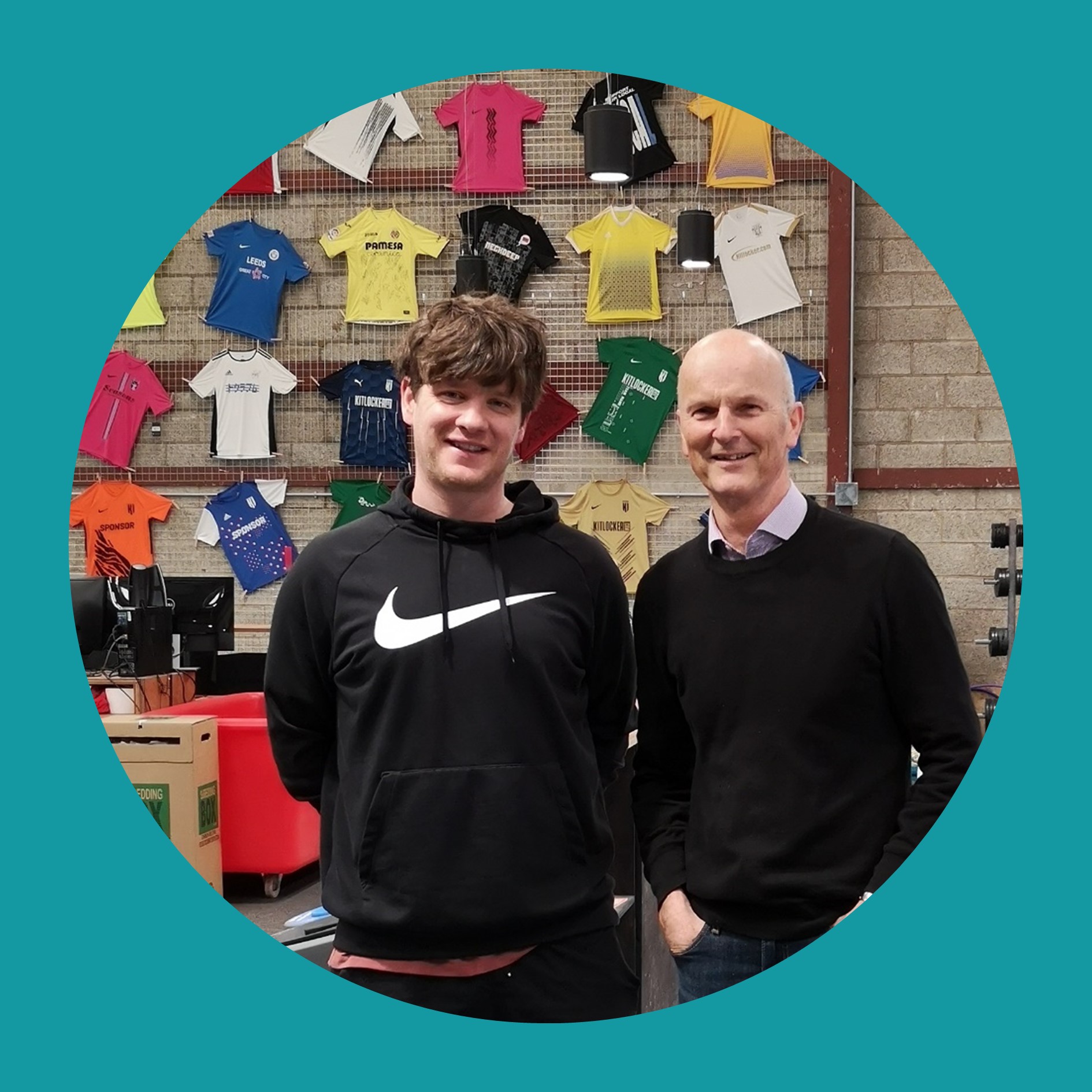
Mike Kent, a manufacturing and e-commerce journey
Mike Kent is Co-Founder and Managing Director of Kitlocker, Sheffield sportswear manufacturer and distributor, and an Associate Lecturer at Sheffield Hallam University.Kitlocker is an online retailer specialising in sportswear, and employing around 100 staff. Before Mike and his fellow MD Tom Ward ran Kitlocker they studied at Sheffield Hallam and played volleyball. After university Tom had the opportunity to play volleyball professionally, but opted to join Mike in implementing the business plan that Mike had produced in his second year.Mike wouldn’t necessarily commend the approach Tom and Mike took to equip themselves for success. In the early years they were “incredibly insular.” Only after the first decade did they become more externally facing. Building out their sales and marketing function was a catalyst for this. Recently the business has started to look at its education and training needs, but that’s more with an eye on the next generation of leaders in the business rather than on the founders. Mike sees his leadership role as being about “understanding where we are, where we are heading, and shaping the company to cater for the step changes that we encounter.” As the company has grown, making plans and communicating them has become more challenging.The aspects of thebusiness that enthuse Mike are problem-solving, particularly in relation to the e-commerce and manufacturing systems, and the people. Mike is intent onensuring that the company’s strategy, systems, and people are congruent.Mike’s approach to leadership has evolved with the business and experience, and is a blend of empathy for team members, support for the development of individuals, and quite an ”autocratic” style. A directive style is not natural to him, but has been a response to the young talent the company has recruited via University of Sheffield and Sheffield Hallam University (SHU) placement schemes. His favourite takeaway from SHU’s ‘Leading through Health and Wellbeing’ course (which Mike, Dave Hembrough and Chris Whitehead have all completed) is “ruthless on the issue, gentle on the person.”He concurs with Peter’s Drucker’s quote “culture eats strategy for breakfast.” Kitlocker, however, does not have a single culture, indeed that would be challenging, because its teams are quite varied in character. The business is thinking about how it facilitates an effective culture in each department.The company’s story helps it in the recruitment of talent. When it comes to retention, the aim is to equip leaders to be more supportive and empathetic in relation to their teams. This needs to be embedded into the appraisal and development systems for all staff.Mike is proud of what Kitlocker’s teams have achieved, rather than what he has achieved (and there’s still plenty more to do). The company hasn’t made any “cataclysmic” mistakes, but it’s made many smaller mistakes and has learnt from them. One of Mike’s inspirations in starting the company was Jagged Globe, a company that lead climbing and mountaineering expeditions. They gave a two-hour talk to Mike’s Business Studies course on what the business does and their experiences as an SME. When Tom Ward said “Let’s do this” Mike cast his mind back to that presentation, which he felt was “a really cool journey.”Mike’s book recommendations are “Creativity Inc” by Catmull and Wallace, which is about managing creativity at Pixar, and “Good to Great” by Jim Collins. Mike is a fan of “The High Performance Podcast.”A growing business and a young family tend to crowd out Mike’s self-care regime, but he has become more aware of the importance of it as he has grown older. He has been working at his exercise regime, but also self-development, and “being mindful of being mindful.”His advice to his 20-year old self would be “Don’t be so insular.” Paying more attention to other companies and the external environment generally would have helped Kitlocker to see the bigger picture. Working more closely with suppliers, and Nike and Adidas, in recent years has greatly improved their understanding of the market.

Edmund Cross, sticking with it
Edmund Cross is a trainer and facilitator, and specialist in creating developmental spaces for individuals and teams.After a childhood in Northern Ireland, Edmund attended the University of Sussex where he studied French, and learnt to identify patterns and understand systems. He then trained as a nurse in Sheffield. He says “it taught me about the practicality of intervening in people’s lives.” Partly as a result of a back injury he moved into workingwith primary care teams on sexual health. After several years with the local health authority he worked at the University of Sheffield. Since being made redundant in a reorganisation he has been working independently – this compelled him to learn how not to be part of an organisation and a hierarchy.Edmund has a reputation for being able to sit with people while they resolve conflict. He puts it down to several skills he has picked up on his journey: sticking with people when they tell you something important, an understanding of rank and power, working with issues as they arise in the moment, and leaning into matters rather than shying away.He says “power underlies everything and we need to talk about it.” All of our relationships have an element of power in them. We experience power very early on, but we don’t talk about it: “it becomes invisible to us, and yet it shapes everything.” Once people have the tools and space to talk about, it becomes easier to surface the associated issues.Over the past five or six years Edmund has developed a way of working that involves introducing people to models, such as the Johari window and the window of tolerance, and then encouraging them to apply them to the business of the group as it arises in the moment. He seeks to help people to trust their own thoughts and emotions.Edmund is an enthusiast for ‘not knowing’: when you approach a problem with an open mind, more possibilities emerge. He adopts an orientation of curiosity and exploration. He finds David Snowden’s Cynefin framework helpful in this respect.Edmund has a daughter with a medical condition. Before her birth, Edmund envisaged a predictable future, afterwards he was dealing with uncertainty and crises as they came up. It taught him to live in the moment and give things his best shot as they arose.Edmund’s proudest achievement in his career concerns when,as a nurse, he acted as an advocate for a seriously ill patient who hadn’t made a will. One of his biggest mistakes was to speak for part of a group that he was facilitating without an invitation, taking on the mantle of leadership when it hadn’t been conferred upon him.The most formative experience for Edmund was a residential at Findhorn (https://www.findhorn.org/) which involved teaching on conflict and change by Ben Fuchs and Andrew Murray. The three books that Edmund would recommend to aspiring leaders are: The Practice of Adaptive Leadership by Ronald Heifetz, Sitting in the Fire by Arnold Mindell, and Difficult Conversations by Sheila Heen, Douglas Stone and others.Edmund’s self-care regime includes sailing, platform diving, and running. His advice to his 20-year old self would be “stick with it and let it unfold.”
Create Your Podcast In Minutes
- Full-featured podcast site
- Unlimited storage and bandwidth
- Comprehensive podcast stats
- Distribute to Apple Podcasts, Spotify, and more
- Make money with your podcast

